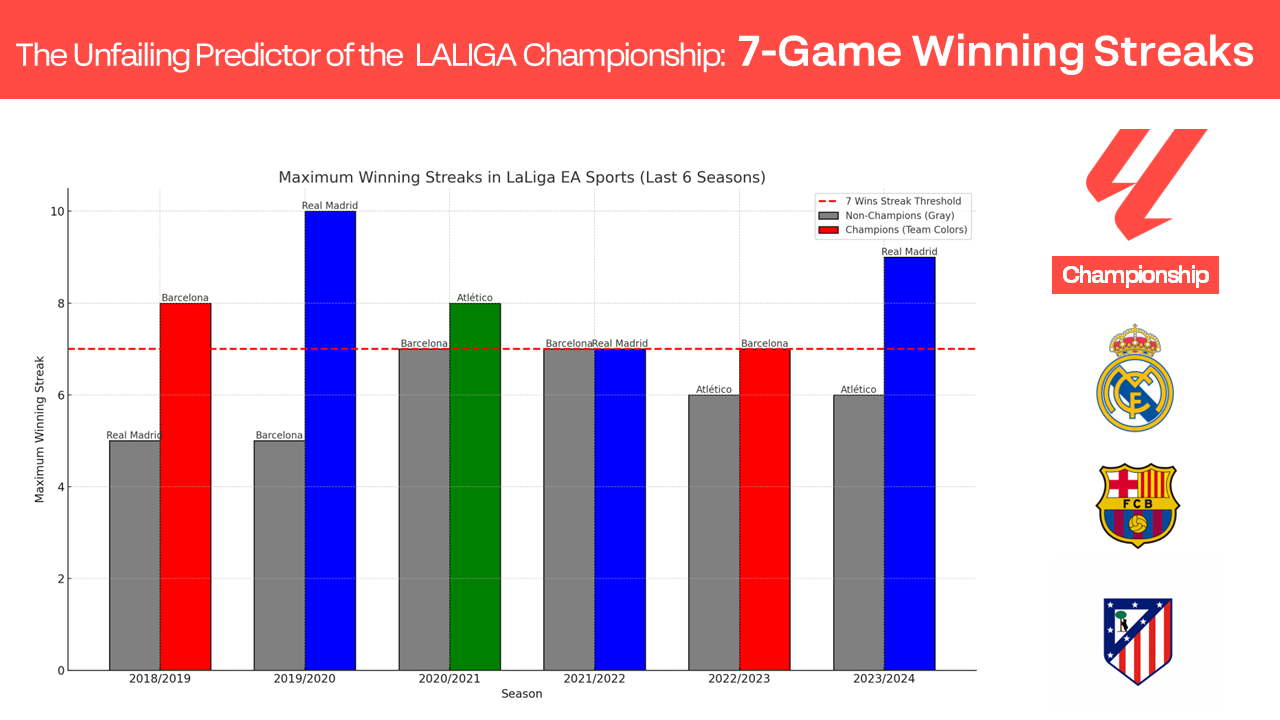
26 Jul The Unfailing Predictor of the LaLiga EA Sports Championship: 7-Game Winning Streaks

Summary
In a recent analysis of LaLiga EA Sports, also known as the Primera División of LaLiga, an unfailing indicator for predicting the champion team has been identified: 7-game winning streaks. Despite the availability of complex data such as goals for (GF), goals against (GA), goal difference (GD), and Expected Goals (xG), these factors have not proven to be as reliable as winning streaks. This study examines the effectiveness of winning streaks as a predictor of success and explores notable exceptions, including teams with high xG and GF values that did not win the championship.
Introduction
Predicting success in sports competitions is a field of great interest to both academics and sports professionals. Traditionally, metrics such as goals for, goals against, and Expected Goals have been used to evaluate team performance. However, in the context of LaLiga EA Sports, one of the most competitive football leagues in the world, 7-game winning streaks have been found to be a stronger indicator of success.
Methodology
The analysis was based on data from the last 6 seasons of LaLiga EA Sports. Variables included goals for (GF), goals against (GA), goal difference (GD), Expected Goals (xG), and winning streaks. Logistic regression was used to assess the relationship between these variables and championship success.
Results
7-Game Winning Streaks: The Unfailing Predictor
The analysis revealed that all teams achieving the longest winning streak of at least 7 consecutive victories won the championship. This finding is particularly notable given the inherent variability in sports performance. The consistency shown by these teams in long winning streaks underscores not only their offensive capability but also their defensive and mental strength. The only exception is Barcelona in the 2021/2022 season, where they achieved a 7-game winning streak but did not win the championship, which was ultimately won by Real Madrid, also with a maximum streak of 7 victories.
Goals For and Expected Goals: Less Reliable Indicators
Although goals for and Expected Goals are important indicators of offensive performance, they do not always correlate with championship success. For example:
- 2020/2021: Barcelona also led in goals for (85) and xG (74.91), but the champion was Atlético Madrid.
- 2023/2024: Barcelona led in goals for (87) and xG (78.51), but the champion was Real Madrid.
These results indicate that high offensive performance, measured by both actual and expected goals, is not sufficient to secure the championship. Defensive factors and contextual elements, such as managing key matches and defensive solidity, play a crucial role.
Discussion
The ability of 7-game winning streaks to predict championship success can be explained by several factors. First, winning streaks reflect not only offensive performance but also solid defense and the ability to handle pressure. Additionally, streaks capture consistency in performance, a critical quality for winning titles in a highly competitive league. The fact that metrics such as goals for and Expected Goals are not equally reliable predictors suggests that these indicators may be incomplete. Goal difference and other defensive metrics do not always correlate with success, highlighting the importance of a holistic view of team performance.
Conclusion
This study highlights the importance of considering both offensive and defensive factors, as well as consistency in performance, when predicting success in sports competitions. 7-game winning streaks have proven to be an unfailing predictor of success in LaLiga EA Sports, surpassing other more complex metrics such as goals for and Expected Goals. This finding underscores the need for a more balanced and holistic approach in sports performance analysis.


